The Greening Diplomacy Initiative: Capturing Innovation
State’s homegrown Greening Diplomacy Initiative relies on seeding, harvesting, sifting, implementing and sharing employees’ innovations and ideas, large and small.
BY CAROLINE D’ANGELO
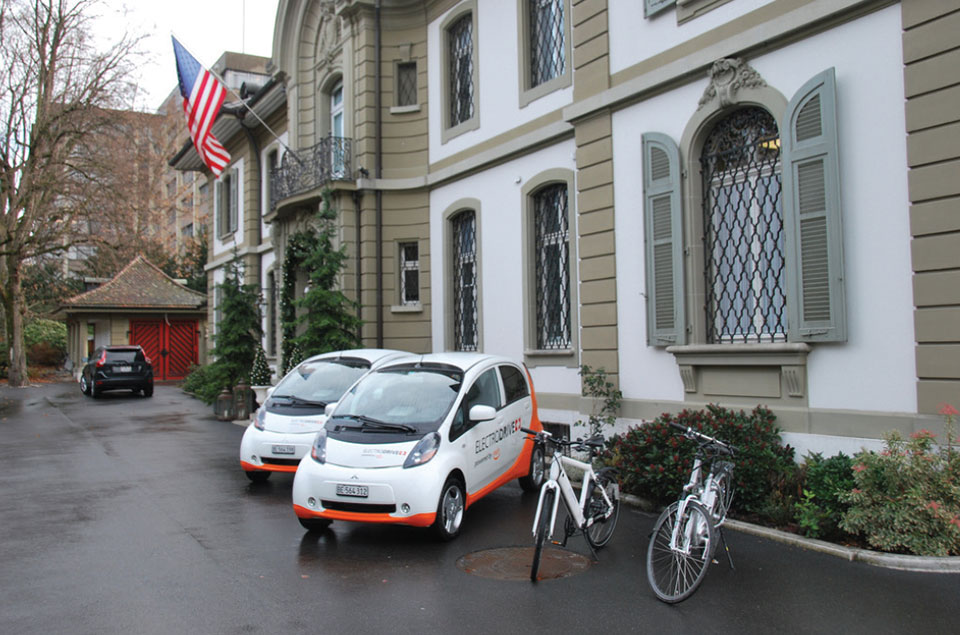
Electric cars and bicycles are parked outside Embassy Bern.
League of Green Embassies
There is an art to innovation. Sometimes, as at the American embassy in Kampala, that innovation results literally in art—such as the beautiful beads and handicrafts that local artisans create from the embassy’s recycled paper and glass.
Sometimes it yields creative solutions, like the tubes that illuminate the State Department’s LEED Gold-certified Human Resources Center in Charleston, S.C., with concentrated sunlight.
At other times, creative innovation can transform the portfolio of energy sources for a locality, such as when the State Department worked with private-sector partners to build new wind and solar farms to generate nearly half the power needed for its facilities in Maryland and the District of Columbia.
Such innovations, both large and small, are driving the greening of the State Department.
Behind this innovation is dedication to conserving natural and financial resources and enhancing the vitality of communities and workplaces. These are also the core tenets of the department’s overarching sustainability effort, the Greening Diplomacy Initiative.
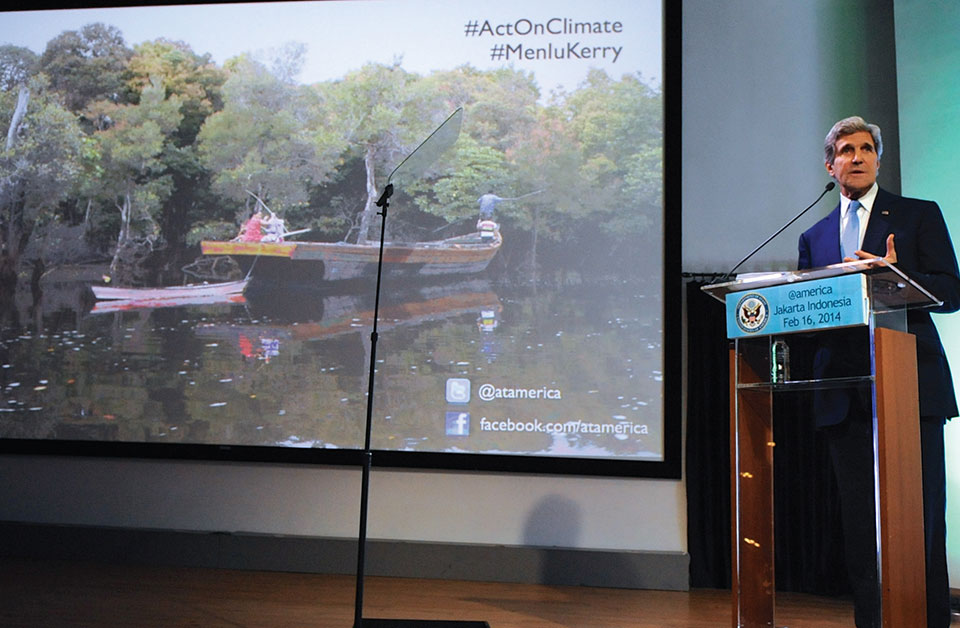
Secretary of State John Kerry delivers the first of three major climate change speeches in Jakarta on Feb. 16.
U.S. Department of State
Bringing Everyone on Board
With 60,000 State Department employees spread across 190 countries, harnessing new ideas can be a challenge—especially when the goal of reducing our environmental footprint is so important to so many. To help coordinate employee creativity and innovation, GDI is overseen by a unique executive body known as the Greening Council, established in 2009. Under Secretary for Management Patrick Kennedy chairs the Council, which consists of other State Department under secretaries, assistant secretaries, special envoys and ambassadors from a diverse cross-section of management, operations and policy-related bureaus and offices.
Through quarterly meetings, the Greening Council provides a forum for cultivating, aligning and enacting employee ideas; developing and implementing department-wide policies; and driving innovation and coordination across all bureaus and diplomatic missions abroad. With senior support behind them, individuals across the department are free to explore, design and implement greening programs, both inside missions and with local community groups.
With 60,000 State Department employees spread across 190 countries, harnessing new ideas can be a challenge.
This department-wide ownership of the GDI is shown through the diversity of roles and expertise within the Council and its working groups. At any particular greening meeting at State, there may be an assortment of policy and regional analysts, engineers, vehicle fleet managers, writers, marketers, architects, information technologists and medical officers.
There are also 150 “green teams” at posts worldwide. These are employee-led groups that work on a variety of sustainability-related activities, from installing solar panels to holding Earth Day events. Many of the strongest teams are also diverse, gathering team members from across the mission, including facility managers, locally engaged staff, family members and general service, public diplomacy, economic and consular officers.
This variety is necessary to overcome the logistical, political and cultural roadblocks to reducing the department’s environmental footprint. Whether in the field or in D.C., the GDI’s success has hinged on the crossover from operations to public diplomacy, using the State Department’s environmental best practices to engage communities and governments. Accordingly, the Greening Diplomacy Initiative both belongs to, and is driven by, State employees.
Steering in 150+ Directions

This solar hot water recirculation system installed on the ambassador’s residence in Pretoria replaced 10 electric water heaters.
League of Green Embassies
Focusing the energy of a far-flung workforce requires integrating innovations from the field with departmental requirements to ensure safe and workable solutions. We need effective communication among posts and with the department to share existing best practices and merge solutions. Too often, time and resources are wasted by continually reinventing the wheel or re-solving the same problem.
The Council Working Group has developed platforms to help centralize information by taking an inventory of greening activities, recognizing leaders, and facilitating global and regional conversation through quarterly teleconferences.
The department’s annual Greening Activities Survey establishes metrics for specific actions that offices and posts can take to reduce their environmental footprint. The results are shared as a means to encourage more action and elicit healthy competition among posts and offices.
Survey questions focus on a range of categories such as residential utilities, transportation, information technology and procurement. They are based on the fact that small, easy steps can offer large payoffs, as well as strategic actions that help the department at large. Intended to also serve as an educational tool, the survey raises awareness of practical actions that can be taken and of resources available to help offices and posts.
The department also celebrates and encourages innovation through the GDI Awards. These annual awards are given to posts or bureaus with the best greening success stories. Using the Sounding Board, the department’s online platform for employees, the program reaches out each spring to collect and share stories about environmental protection efforts. These range from boosting energy efficiency at Embassy Beijing and increasing Embassy Dhaka’s electric vehicle fleet to Consulate Krakow’s participation in a local park clean-up program and Embassy Kathmandu’s composting and community food garden initiative.
At any particular greening meeting, there may be policy and regional analysts, engineers, vehicle fleet managers, writers, marketers, architects, information technologists and medical officers.
Employees can read all of the submissions and vote for their favorite story for the GDI “People’s Choice” Award. The Greening Council selects an overall winner, whose work is highlighted and praised by department leadership at the highest level. The Bureau of Overseas Buildings Operations also gives an honorable mention for post excellence in utility data reporting.
The stories show that posts worldwide serve as incubators of innovation. By sifting through the success stories and survey responses, the Council seeks not only to recognize good work but also to identify common challenges and creative solutions across regions. Discovering how some posts tackle an issue helps Washington identify where its resources might best be used to exploit economies of scale or coordinate a single solution that helps the entire enterprise.
Reducing Energy Use
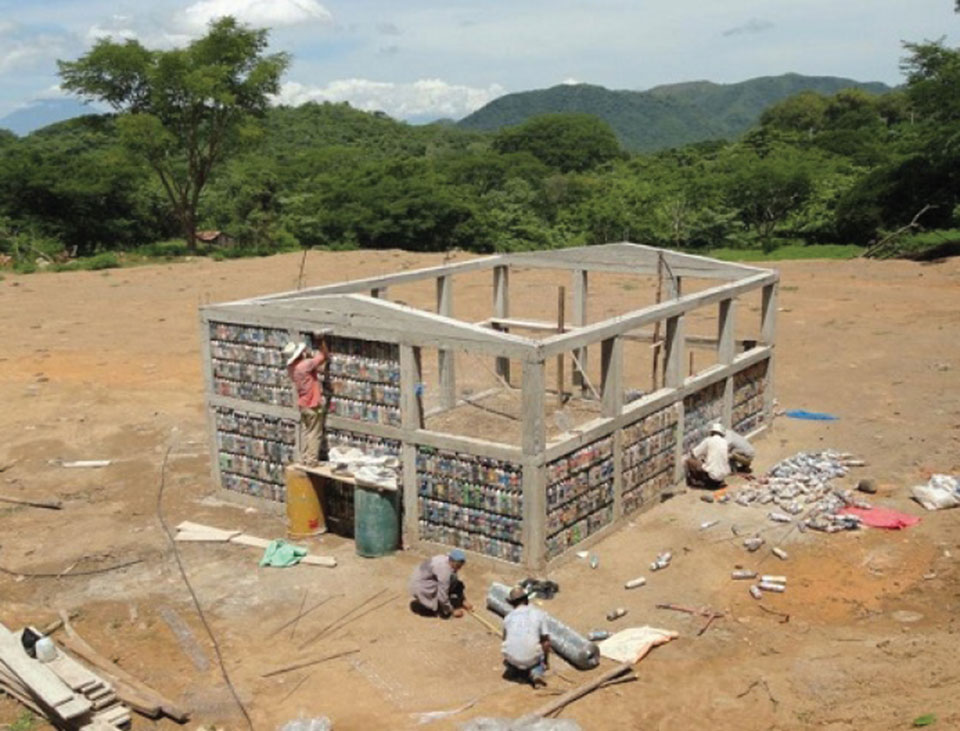
Embassy San Salvador used its recycling program to assist in construction of this “plastic bottle school” for 26 students of the community of Candelaria.
Courtesy of Embassy San Salvador
A common challenge mentioned in survey responses from many posts is controlling the costs of residential utilities. How does a post encourage individuals to responsibly keep their utilities consumption low when they are not paying for utilities themselves? Many posts have identified this issue as critical to helping them bring down overall operational costs and environmental impact, and have sought help from other posts and bureaus in Washington to identify mechanisms to modify residential behavior.
Hoping to learn from the field, Washington has been watching Consulate General Hong Kong as it builds a program to enable staff to track their own energy consumption at home and see how their usage compares to that of their peers. The tracking devices also allow residents to see their energy consumption in real time, enabling them to identify equipment and appliances around the home that are energy hogs.
Washington is now seeking a means to help posts deploy this type of solution globally, using its larger purchasing power to lower equipment and installation costs. In addition, in response to the questions on behavior modification, OBO developed a new chapter on residential utilities in its Guide to Green Embassies: Eco-Diplomacy in Operation that highlights simple tips and actions to bring down energy and water consumption.
Innovation Begets Innovation
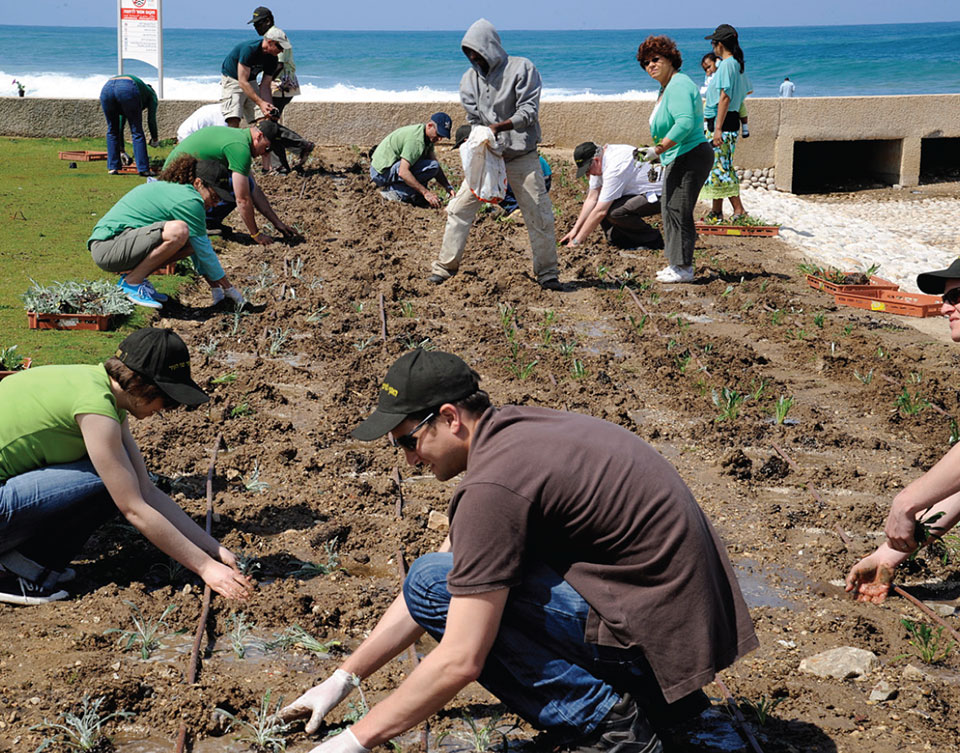
Staff and friends of Embassy Tel Aviv, along with municipal representatives, celebrate Earth Day 2012 by planting a garden in the vicinity of the beach at Jaffa Slope Park.
U.S. Department of State
During the summer of 2010 the State Department was looking for a power purchase agreement that would add significantly more clean energy to its energy portfolio and support President Barack Obama’s goal of building more alternative energy capacity on the U.S. grid—and do so in a manner that would be cost-neutral or reduce overall energy costs. The solution—which involved switching nearly 50 percent of headquarters’ power to alternative energy and building a new wind farm in Pennsylvania and a solar farm in New Jersey— produced an additional unexpected benefit, MeterNet.
MeterNet is an automated smart meter initiative that enables the department to accurately track its facilities’ energy consumption in the D.C. area. Having accurate energy accounting is crucial to exploiting and building alternative energy sources, which not only reduce the department’s environmental footprint but save money. Moreover, with this real-time data, department engineers have been able to quickly identify and address chronic issues in facilities and equipment, avoiding millions of dollars in added costs. The Greening Council is now working to expand MeterNet overseas.
Posts are also seeing great ideas spawn new ones, to the benefit of local communities and economies, and using the greening of their operations to spur diplomatic outreach. Embassy Bujumbura, for example, had two problems it wanted to address. One was figuring out a way to reuse its waste in an area without recycling infrastructure. Another was widespread deforestation in Burundi, which stems, in part, from demand for charcoal for cooking.
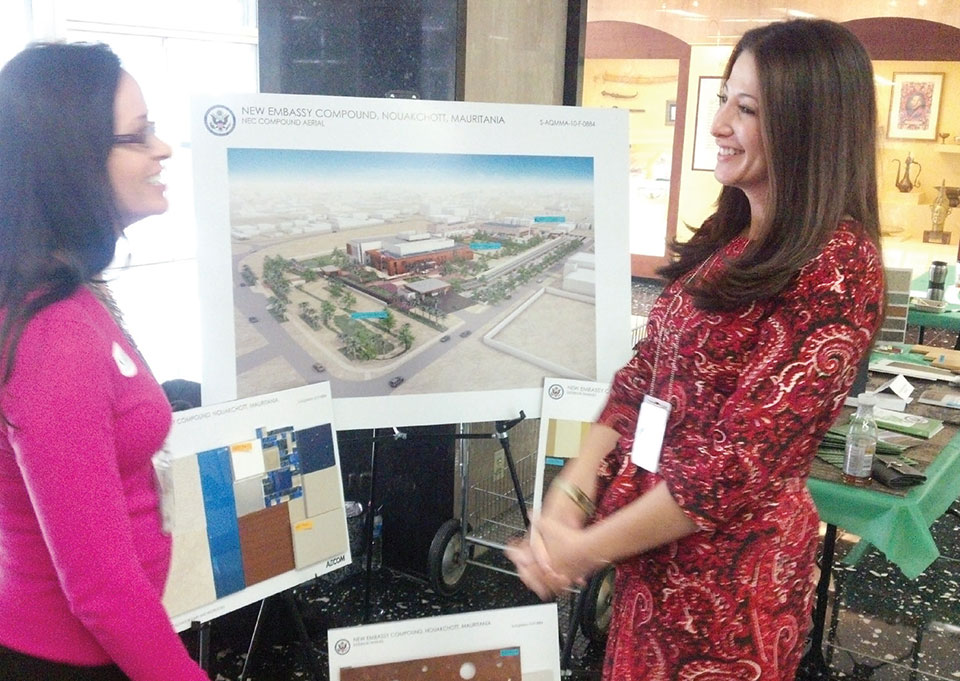
Deputy Assistant Secretary Julia Nesheiwat, at right, of the Bureau of Energy Resources at the State Department’s celebration of America Recycles Day. Such GDI events provide connection points for NGOs, companies and universities, as well as department employees.
U.S. Department of State
The embassy’s innovative Green Team decided to solve both problems at once by donating their shredded paper to local bio-charcoal producers, who use agricultural and paper waste to create briquettes. This helps reduce the use of traditional charcoal, which is made from a dwindling supply of trees.
Other posts are partnering with local businesses to initiate environmental activities. In the absence of countrywide recycling infrastructure, Embassy Amman partners with small businesses to manage recycling at post, from car batteries to glass. These projects mix diplomacy with sustainability and support the development of communities and economies.
This joining of operations and diplomacy extends up from the local to the regional and global level. GDI activity includes coordination of two additional platforms for communication and sharing best practices: the D.C. Greening Embassies Forum and the League of Green Embassies. Both of these coalitions use the practical goal of making diplomatic missions as green as possible to bring together businesses, NGOs and other stakeholders.
Future Sustainability
The department’s future sustainability actions rest on the success of current innovations. Learning from its purchase of alternative power for facilities in the Washington, D.C., region, the department is now looking for opportunities to do something similar abroad. Posts located in energy markets seeking reliable customers with long-term horizons offer a chance for the department to use its market demand to encourage the growth of new alternative energy production facilities worldwide, while also encouraging the use of U.S. goods and services in such agreements.
Deployment of advanced metering systems at posts worldwide gives the department the ability to analyze utilities consumption in real time and benchmark building design and performance, enhancing future designs and adjusting current structures. This data will also help the department better respond to and drive market opportunities.
How does a post encourage individuals to responsibly keep their utilities consumption low when they are not paying for utilities themselves?
By transforming the department’s annual survey and greening success stories into an iPad app and disseminating them through various social media channels, the public can not only learn about the department’s work toward sustainability; they can also see how they might carry out similar actions within their own organizations or homes. Deploying best practices and U.S. technologies abroad at posts is also a platform to showcase American goods and services and begin new discussions on the future of the green economy and energy grids.
The future of greening at the State Department will not just be about transforming our own operations, but sharing best practices with our international partners and building new relationships based on a global effort to be better environmental stewards.

